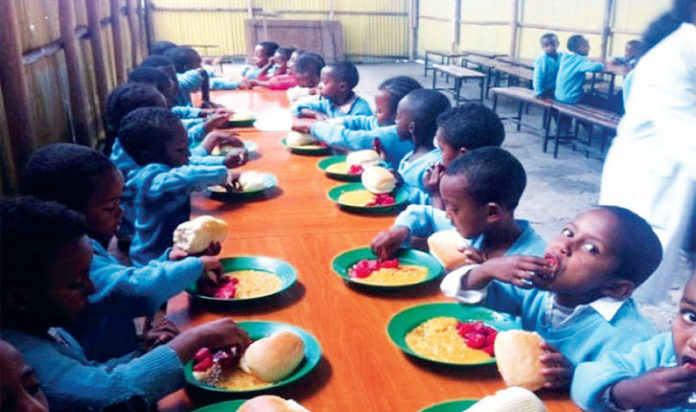Since the commencement of the implementation in 2016, the School Feeding Programme has been steeped in rumours, lack of transparency and scathing criticisms. The bulk of the criticisms stem from the fact that many believe that the amount spent on the project does not match the services said to have been provided, leaving the people with the question of who is actually eating the food. We look at how the programme has fared in various states as well as the pulse of Nigerians on the project. Report by ROLAND OBY OGBONNAYA, SAMUEL OGIDAN, TOYIN ADEBAYO, SUZAN EDEH, PATIENCE OGBODO-IWUAGWU, CHUKWUJEKWU ILOZUE, GBENGA FATUROTI, APATA OYENIRAN
For Nigeria, the policy for the school feeding programme came in the realisation of the central role of nutrition to education. The Federal government of Nigeria, in collaboration with the New Partnership for African Development (NEPAD), World Food Programme (WFP), United Nations International Children’s Fund (UNICEF), and other international development partners (IDPs), developed what they described as the Home Grown School Feeding and Health Programme (HGSFHP).
According to reports, the programme was launched on September 26, 2005, as a new project that will support government action to deliver cost-effective school feeding programme in sub-Saharan Africa with the belief that the project will promote local agriculture and benefit rural farmers by using locally-sourced food, providing regular orders and a reliable income for local farmers, which majority of whom are women while improving the education, health and nutrition of children.
According to the policy document, the overall goal of the programme in Nigeria is to reduce hunger and malnutrition among school children and enhance the achievement of Universal Basic Education, with the primary objectives of reducing hunger among Nigerian school children, improving the nutritional health status of school children, increasing school enrolment, attendance, retention and completion particularly of children in rural communities and poor urban neighbourhoods, as well as enhancing comprehension and learning achievements of the pupils.
Though the programme was launched in 2005, it took the government of President Muhammadu Buhari to begin to implement it in 2016, and since then the project, like every Nigerian thing, has been steeped in controversy, scathing criticism and condemnation. Government has not helped matters, as the implementation lacks transparency as the services on the ground does not match the funds spent. The programme has been so uncoordinated that many Nigerians are now beginning to wonder who are the people eating the food after all?
independent





